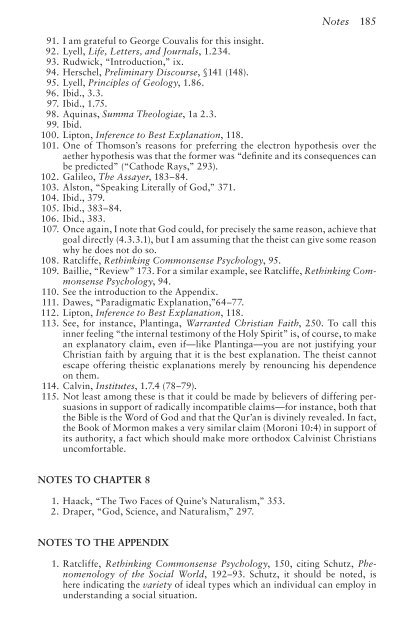Theism and Explanation - Appeared-to-Blogly
Theism and Explanation - Appeared-to-Blogly
Theism and Explanation - Appeared-to-Blogly
You also want an ePaper? Increase the reach of your titles
YUMPU automatically turns print PDFs into web optimized ePapers that Google loves.
Notes 185<br />
91. I am grateful <strong>to</strong> George Couvalis for this insight.<br />
92. Lyell, Life, Letters, <strong>and</strong> Journals, 1.234.<br />
93. Rudwick, “Introduction,” ix.<br />
94. Herschel, Preliminary Discourse, §141 (148).<br />
95. Lyell, Principles of Geology, 1.86.<br />
96. Ibid., 3.3.<br />
97. Ibid., 1.75.<br />
98. Aquinas, Summa Theologiae, 1a 2.3.<br />
99. Ibid.<br />
100. Lip<strong>to</strong>n, Inference <strong>to</strong> Best <strong>Explanation</strong>, 118.<br />
101. One of Thomson’s reasons for preferring the electron hypothesis over the<br />
aether hypothesis was that the former was “defi nite <strong>and</strong> its consequences can<br />
be predicted” (“Cathode Rays,” 293).<br />
102. Galileo, The Assayer, 183–84.<br />
103. Als<strong>to</strong>n, “Speaking Literally of God,” 371.<br />
104. Ibid., 379.<br />
105. Ibid., 383–84.<br />
106. Ibid., 383.<br />
107. Once again, I note that God could, for precisely the same reason, achieve that<br />
goal directly (4.3.3.1), but I am assuming that the theist can give some reason<br />
why he does not do so.<br />
108. Ratcliffe, Rethinking Commonsense Psychology, 95.<br />
109. Baillie, “Review” 173. For a similar example, see Ratcliffe, Rethinking Commonsense<br />
Psychology, 94.<br />
110. See the introduction <strong>to</strong> the Appendix.<br />
111. Dawes, “Paradigmatic <strong>Explanation</strong>,”64–77.<br />
112. Lip<strong>to</strong>n, Inference <strong>to</strong> Best <strong>Explanation</strong>, 118.<br />
113. See, for instance, Plantinga, Warranted Christian Faith, 250. To call this<br />
inner feeling “the internal testimony of the Holy Spirit” is, of course, <strong>to</strong> make<br />
an explana<strong>to</strong>ry claim, even if—like Plantinga—you are not justifying your<br />
Christian faith by arguing that it is the best explanation. The theist cannot<br />
escape offering theistic explanations merely by renouncing his dependence<br />
on them.<br />
114. Calvin, Institutes, 1.7.4 (78–79).<br />
115. Not least among these is that it could be made by believers of differing persuasions<br />
in support of radically incompatible claims—for instance, both that<br />
the Bible is the Word of God <strong>and</strong> that the Qur’an is divinely revealed. In fact,<br />
the Book of Mormon makes a very similar claim (Moroni 10:4) in support of<br />
its authority, a fact which should make more orthodox Calvinist Christians<br />
uncomfortable.<br />
NOTES TO CHAPTER 8<br />
1. Haack, “The Two Faces of Quine’s Naturalism,” 353.<br />
2. Draper, “God, Science, <strong>and</strong> Naturalism,” 297.<br />
NOTES TO THE APPENDIX<br />
1. Ratcliffe, Rethinking Commonsense Psychology, 150, citing Schutz, Phenomenology<br />
of the Social World, 192–93. Schutz, it should be noted, is<br />
here indicating the variety of ideal types which an individual can employ in<br />
underst<strong>and</strong>ing a social situation.



